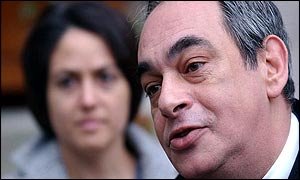The View from Ramallah

UT:What are the prospects and how should the peace process, which has been almost moribund now for quite some time, certainly since Hamas' electoral victory last year, be revived?
AS: First of all, the peace process was nonexistent for the last six years, not since Hamas' election a year ago.
UT: Well it was certainly nonexistent during this violent second intifada in which there was virtual warfare between Israel and the Palestinians.
AS:If you go back to the (former U.S. Sen. George) Mitchell Report, it says that the second intifada started as a nonviolent movement, and it was the ferocious repression of the Barak government then that pushed a few unwisely to use the little weapons they had. But the peace process was nonexistent the last six years. And by the way, this is one of the major reasons why Hamas won the legislative elections; nonexistence of the peace process for the last six years and the unconvincing nature of that process in the previous years. I believe in the need of a third-party (intervention). So I personally believe that the American role is decisive. In my analysis, I always – even in my dealings with the State Department – often speak of what I call the self-inflicted impotence of the American administration. America is a superpower all over the world except in its dealings with Israel. And up to now, we have witnessed what I call static diplomacy. You're not unaware that Dr. (Condoleezza) Rice has been there in the area in the last few months nine times with very little fruit of that agitation. And I perceive, indeed, that America should be more vocal, visible and assertive. We have a wonderful window of opportunity if the players want to capitalize on it. The Arab world is available for historical compromise, was available for that compromise for years.
Afif Safieh, Palestinian Representative to the US, was in San Diego last week to give a presentation to the San Diego World Affairs Council. This interview appeared in today's (Sunday) San Diego Union Tribune (UT) paper. While some of the interview is ok, Safieh was interviewed by members of the UT editorial board, who, to me, seem to have been singularly unprepared for the interview. The tenor and scope of some of the questions are poor and indicate a weak grasp of the subject, inapproporiate for a major metropolitan daily with some recent pultizers.
They had a unique opportunity to understand the Palestinian position, especially in light of last year's events in the West Bank and Lebanon, the Mecca Accords, and now Mubarak's move against Egyptain bloggers and the Egyptian Constitution, and Rice's oddly ineffective (personally, I think they are very effective- window dressing is never asked to be profound or intelligent) jaunts around the region.
You can read the rest and judge for yourself.
They had a unique opportunity to understand the Palestinian position, especially in light of last year's events in the West Bank and Lebanon, the Mecca Accords, and now Mubarak's move against Egyptain bloggers and the Egyptian Constitution, and Rice's oddly ineffective (personally, I think they are very effective- window dressing is never asked to be profound or intelligent) jaunts around the region.
You can read the rest and judge for yourself.


